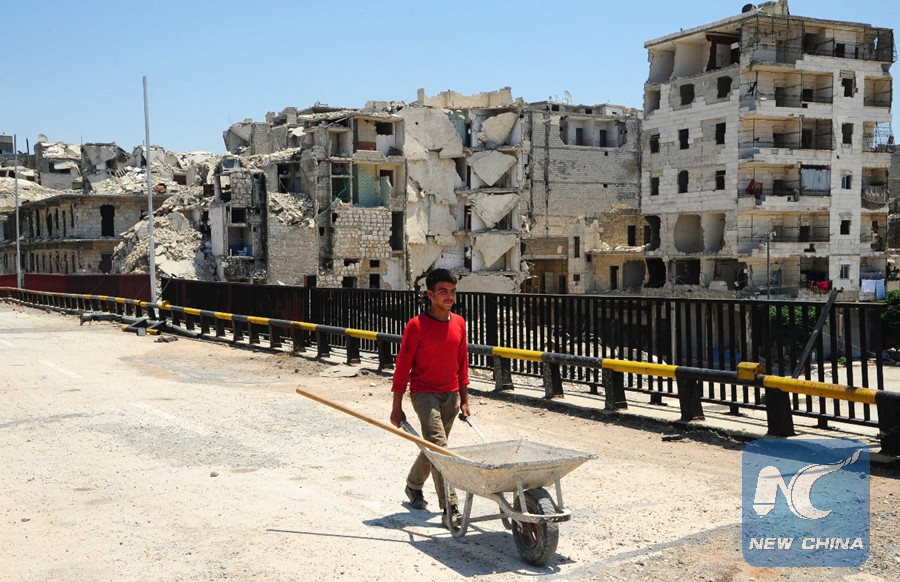
Photo taken on June 6, 2018 shows a construction worker working on the rehabilitation of the al-Haj Bridge in Syria's northern city of Aleppo. (Xinhua/Ammar Safarjalani)
by Hummam Sheikh Ali
ALEPPO, Syria, June 9 (Xinhua) -- About 70 percent of the infrastructure facilities in Syria's northern city of Aleppo have been reconstructed since the city was fully retaken by the Syrian army in late 2016.
After Aleppo's liberation from the rebels, the streets were cleared from the rubble amid efforts to rehabilitate bridges and intersections in the city, once known as the economic capital of Syria.
The efforts are considered as a prelude to the reconstruction process of the largely destroyed parts in east Aleppo, as the government was quick to remove the rubbles from main streets and open the closed roads to facilitate the return of civilians to their homes, after the war was over.
Fares Fares, an executive member of the Aleppo Municipal Palace, told Xinhua that the first stage of the rehabilitation process was clearing the streets, which took three to four months to open the main roads and later the sub-routes.
The second stage was preparing the infrastructure of the city, such as fixing the networks of the sewage, water, and communications, to enable the civilians to return home, he said, adding that some schools have been reopened as well as police stations and bakeries.
Then the third stage is reviving the production through rehabilitating the infrastructure in the industrial zones and marketplaces.
Fares said that all the efforts of rehabilitation have so far been implemented locally, without any help from foreign companies despite the wide-scale destruction.
Local restoring efforts will pave the way for reconstruction process in cooperation with foreign companies from "friendly countries."
"We are overcoming the difficulties with national efforts but the reconstruction of what had been destroyed needs foreign companies in addition to the national cadres," he said, reiterating that the difficulties are the wide-scale destruction.
A large number of the construction machines of the Syrian government had been destroyed by the terrorist groups "so we need heavy machines and large capital stocks," he said.
Fares expressed readiness to welcome foreign help, saying "we are ready to receive companies from Russia and China or any other friendly countries, which have a desire in taking part in the reconstruction process in Syria."
Jisr al-Haj, or the al-Haj Bridge, is one of the important bridges in Aleppo as it connects the western parts of Aleppo with the eastern neighborhoods and the airport of Aleppo.
The bridge has witnessed several explosions ahead of the rebels' withdrawal from the eastern part of the city.
Kumait Asi al-Sheikh, the engineer responsible for the rehabilitation of the al-Haj bridge, told Xinhua that the bridge is an important part of the traffic system and considered as an important cross point in the southern part of the city, as it's one of the main routes for delivering goods to neighborhoods.
The engineer noted that they have faced difficulties when attempting to fix the bridge due to the lack of heavy machines.
"The bridge is prefabricated and needed big machines to lift it up, and we lost such machines when the terrorists were in the city," he said.
He said the bridge will be back in service in two months, adding that it will be equipped with power-saving lights.
Al-Sheikh said that two other bridges have been rehabilitated as well, namely the al-Sha'ar and Sakhour bridges, as both are important to ease the traffic congestions in Aleppo.
The rehabilitation process also expanded to the destroyed roundabouts of the city, as currently the Saba'a Bahrat square in Aleppo is being rebuilt from scratch after its destruction during the war.
Muhammad Basul, another engineer, told Xinhua that the roundabout is under construction with a new design.
"The Saba'a Bahrat roundabout is considered as the gate to the old Aleppo city and it was completely destroyed as a result of the war. We are rehabilitating this area through local companies in cooperation with the Aleppo municipality," Basul said.
Aleppo could be an example of starting reconstruction in Syria, whose entire cities are in ruins with an estimated restoring cost of over 250 billion U.S. dollars.

